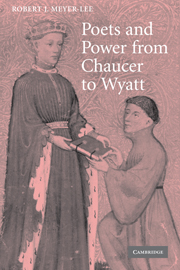PART III - FROM LANCASTER TO EARLY TUDOR
Published online by Cambridge University Press: 27 October 2009
Summary
In 1614, an obscure poet named Thomas Freeman published a diptych of epigram collections in which biting satirical and moralistic pieces alternate with increasingly more frequent, and apparently heartfelt, paeans to other poets. The subjects of the latter include many of his most illustrious contemporaries: Daniel, Donne, Heywood, Nash, Shakespeare, and Spenser. But they also reach back to the misty beginnings of the English poetic tradition in a eulogy to its founding triumvirate:
Pitty ô pitty, death had power
Ouer Chaucer, Lidgate, Gower:
They that equal'd all the Sages
Of these, their owne, of former Ages[.]
Important to Freeman is nothing specific about the poems of Chaucer, Lydgate, or Gower, but rather the idea of an embodied origin of vernacular poetic authority. This origin is locatable in history and generative of successors, and at the same time transcends history as the point of entry of the timeless wisdom of “all the Sages.” It is, in other words, the notionally absolute intellectual and moral basis on which a tradition may be built. Most likely, Freeman was not aware that, of the three authors making up the conventional formula, Lydgate provides the most direct precedent for this self-authorizing strategy. Freeman no doubt understood himself as inspired by classical precedent, and his immediate vernacular model was Ben Jonson. Yet, in opening his collection with a series of seven epideictic addresses to the politically powerful (from King James down to Freeman's immediate patron, Lord Windsor), identifying his first-person speaker with his historically specific person, and locating moral authority in the latter by means of reflexive praise, he reproduces the basics of Lydgate's laureate poetics.
- Type
- Chapter
- Information
- Poets and Power from Chaucer to Wyatt , pp. 125 - 130Publisher: Cambridge University PressPrint publication year: 2007

